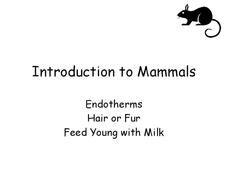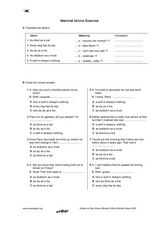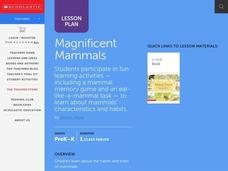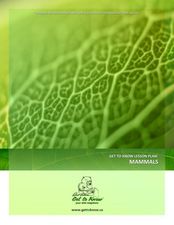Super Teacher Worksheets
Mammal Scavenger Hunt Activity
Did you know that a polar bear's skin is actually black? Or that the lightest mammal weighs less than a paperclip? Young scientists learn these and other amazing facts about mammals as they explore the animal kingdom with...
Curated OER
Introduction to Mammals
Biology learners grasp the characteristics of mammals by viewing this succinct slide show. They learn that mammals are divided into three gestation-related groups: prototheria, metatheria, and eutheria. They examine the characteristics...
Curated OER
Birds and Mammals
Providing a higher-level thinking experience, this presentation provides an in-depth and interesting review of mammals. The terms used in the presentation give students a chance to be exposed to scientific classifications. There is also...
Curated OER
Technology Squares: Mammals
Review basic vocabulary related to mammals. This short quiz game allows students to test their skills and understanding of scientific vocabulary. This game is appropriate for grades 5-7 and covers very basic concepts.
American Museum of Natural History
Extreme Mammals
Extreme characteristics can create some unusual mammals. Learners flip through a slide show of some of the most interesting mammals that are both living and extinct. Implement as a remote learning resource or use in-class to review...
Biology Junction
Mammals
Mammals include more than 4,000 species and represent the most dominant land animals on Earth. Scholars learn about the large variety of mammals, including orders unfamiliar to most. The presentation highlights the characteristics and...
American Museum of Natural History
Moving Mammals
How many different ways do mammals move from place to place? An online resource uses animation to show how different mammals move. Learners use a slider to speed up or slow down a variety of mammals. The versatile lesson works as a...
Curated OER
Mammal Mobile
Short but sweet. Younger learners will view images and hear about the characteristics that make-up mammals, they will then discuss why a particular animal is, or is not, a mammal providing specific details. They will then create a mammal...
Curated OER
Mammals of Fields, Meadows, and Hedgerows
In this mammals worksheet, students research the internet to find information and answer short answer questions about mammals of fields, meadows, and hedgerows. Students complete 12 questions.
Purdue University
Common Indiana Mammals
Mammals all have their own story to tell. A set of 34 cards outlines the key characteristics of different mammals. The cards include images of each mammal as well as their skulls and tracks. The back of the cards describe characteristics...
Curated OER
What Class Are You In?
Classifying animals has never been this much fun! Pupils discuss the animal groups, fish, reptiles, amphibians, mammals, birds, and also identify their characteristics. Then, they take pictures of animals and classify them in a group...
Curated OER
Mammals
Students examine the characteristics of mammals through video clips, and slide shows. Lesson includes clips of fastest land animal, biggest mammal, loudest mammal and tallest animal.
Curated OER
Magnificent Mammals
Students experience center activities to study the habitats and traits of mammals. They play a memory game, eat like mammals, produce artwork and read mammal books.
Curated OER
Mammal Teeth and Skulls-Adaptations and Identification
Student study the differentiation of teeth and skull adaptations in mammals in general and 14 common terrestrial mammals. They explore more about these mammals, their natural history, their adaptations and their identification through an...
Curated OER
Mammal Idioms Exercise
In this grammar and biology worksheet, learners explore mammals using idiomatic expressions. Students match five expressions to their correct meaning and then complete eight multiple choice questions using the idiomatic expressions.
Curated OER
Magnificent Mammals
Students study the habits, traits, and characteristics of mammals. They look at animal tracks that are taped around the room, and at pictures of baby and adult mammals. Next, they determine how mammals move and eat, and look at their...
Curated OER
Marvelous Mammals- Non-Fiction Reading Comprehension Worksheets
In this mammals non-fiction reading comprehension worksheet, 3rd graders read a one page selection about the characteristics of mammals. They answer 10 questions based on the reading including true and false, short answer, and multiple...
Curated OER
Mammals Crossword
In this mammals worksheet, students complete a crossword puzzle with 37 questions about characteristics, behavior and types of mammals.
Curated OER
Identifying Mammals
Students investigate mammals. In this biology lesson, students use various websites to investigate mammals and their body parts. Students take notes the websites.
Curated OER
Australian Mammals: Evolutionary Development as a Result of Geographic Isolation
Students comprehend the difference between monotremes, marsupials, and placental mammals. They are able to compare and contrast these organisms (Australian mammals) with other mammals. Students are able to identify Australian mammals.
Curated OER
Adaptations to Environments with Mammals
Fifth graders, after viewing a PowerPoint on different mammals, analyze what a biome is. Then they choose a mammal to research and go outside to feel the grass and leaves and hypothesize about which biome they live in as well as its...
Curated OER
Characteristics of Snakes and Turtles
Students examine the characteristics of snakes and turtles and compare/contrast reptiles with mammals. They watch a video, answer discussion questions, complete information charts, conduct Internet research, and create a habitat diorama.
Curated OER
Get to Know: Mammals
Students discover the mammals in their community. In this animal lesson, students survey their school grounds for signs of mammals. Students examine tracks, droppings, and other signs of wildlife to learn more about the animals and their...
Curated OER
Environment: Endangered Mammal Project
Students research different mammals and create illustrations and narratives about them. Working individually or in small groups, students compose their rough drafts prior to creating their posters or dioramas. Students present short...

























